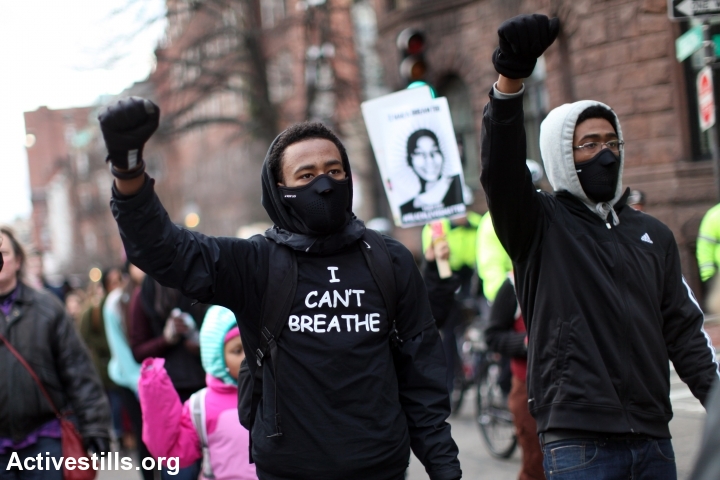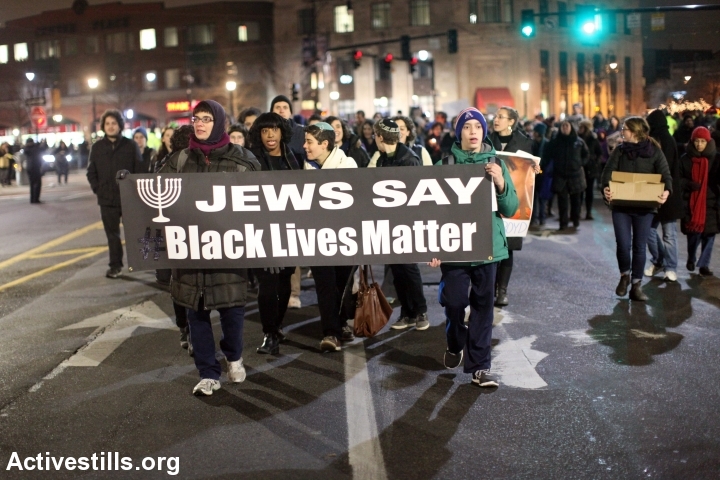While numerous major Jewish organizations and leaders have remained silent, many in the U.S. Jewish community have been thrown for a loop by black American solidarity with the Palestinian struggle, and the terminology that sometimes includes.

The Movement for Black Lives, a coalition of more than 50 organizations representing black Americans, published a comprehensive platform this week that addresses the systemic racism, violence, oppression and discrimination faced by their communities.
The document, which is not shy in declaring that not all of its needs can be addressed with policy, also includes six policy briefs — End the War on Black People, Reparations, Invest-Divest, Economic Justice, Community Control, and Political Power — that include diagnoses and prescriptions aimed at making tangible and attainable change in the short term.
The 37,000-word Movement for Black Lives (MBL) document outlines one of the most important issues facing the United States today and how to address it. However, a number of Jewish and pro-Israel individuals and organizations took issue with one sentence, or to be more specific, one word: genocide.
In the policy brief on the need to cut military expenditures — both to end American-funded injustices overseas, but also to redirect billions of dollars to “domestic infrastructure and social programs to meet the needs of Black people and working class communities within the U.S.” — the MBL document states that the United States government, through its funding of the Israeli military and arms industry, “is complicit in the genocide taking place against the Palestinian people.”
A number of Jewish and Israel-related individuals and organizations in the U.S. responded with everything from outrage to disappointment to silence. T’ruah, a coalition of rabbis committed to acting on human rights, published a statement saying it agrees with most of the MBL platform but at the same time calls out its use of the term “genocide” in relation to Israel’s treatment of Palestinians and rejects its endorsement of the Palestinian-led Boycott, Divestment and Sanctions (BDS) campaign.
“While we agree with many of the policy recommendations, we are extremely dismayed at the decision to refer to the Israeli occupation as genocide,” the T’ruah statement read, adding that while it is committed to ending the occupation, “there is no basis for comparing this situation to the genocides of the 20th century, such as those in Bosnia-Herzegovina, Rwanda, or Armenia, or the Nazi Holocaust in Europe, each of which constituted a calculated plan to destroy specific groups, and each of which killed hundreds of thousands to millions of people.”
The Rome Statute, the founding document of the International Criminal Court which serves as a contemporary codification of war crimes and crimes against humanity, defines genocide as any number of war crimes “committed with intent to destroy, in whole or in part, a national, ethnical, racial or religious group.”

The Jewish Community Relations Council of Boston (JCRC), on the other hand, released a statement disassociating itself with the entire Black Lives Matter movement and platform. “JCRC cannot and will not align ourselves with organizations that falsely and maliciously assert that Israel is committing ‘genocide’,” it wrote, also calling attention to the MBL’s endorsement of the Boycott, Divestment and Sanctions (BDS) campaign. “We reject participation in any coalition that seeks to isolate and demonize Israel singularly amongst the nations of the world.” (Other local JCRCs issued more nuanced responses.)
It is worth noting that the Invest-Divest section of the MBL platform does not, in fact, single out Israel. It also denounces and calls for divestment initiatives to address the millions of civilian deaths in Washington’s “global war on terror,” military and other interventions in Central and South America and the Caribbean, deadly drone operations throughout Africa and the Middle East, indirect complicity in the genocides perpetrated in the Democratic Republic of Congo, and the arming of human rights violating groups throughout Africa.
In the coverage the MBL platform got in the Jewish and Israeli press, strangely, there was a noticeable absence of reactions from major Jewish American organizations and public figures that normally waste no time putting out statements rejecting anything that even resembles criticism of Israel.
Other Jewish American organizations, like Jewish Voice for Peace (JVP), fully endorsed the platform without reservation. In its statement on the matter, JVP said it is “deeply disappointed by the response from a number of Jewish organizations to the platform, particularly the “Invest-Divest” section that endorses the Boycott Divestment and Sanctions (BDS) movement and makes a clear call for Black/Palestinian solidarity.”
Those organizations, JVP continued, “are rejecting a thorough and inspiring transformational set of policy ideas developed by a broad coalition of Black leaders simply because these Black leaders have explicitly linked the experiences and struggles of Palestinians with their own.”
Writing on his personal blog, Rabbi Brant Rosen praised the platform while acknowledging the difficulty that some American Jews might have with the use of the term genocide. The bottom line, wrote Rabbi Rosen of Tzedek Chicago, is that the MBL platform “[is] a challenge for the entire progressive Jewish community at large”:
If we claim to ascribe to a power analysis that views systems of oppression as intersectional and interrelated, we simply constantly cannot make an exception when it comes to Israel. The black community is increasingly finding common cause with Palestinians – and for good reason. Both are oppressed by the same systems, the same weapons, and the same security companies. It is not by coincidence that American police departments around the country are increasingly trained by the Israeli military.
If we truly seek to be to relevant this undeniably growing movement, we need to make these connections as well. No matter how uncomfortable it might make us.
Postscript:
Personally, I disagree with using the term genocide in this context — I don’t believe the legal or even colloquial definition is met, and using it to describe non-genocidal situations harms efforts to educate about and stop the most atrocious crimes committed by mankind, past, present and future. Furthermore, the unequivocal connotation of genocide in the Israeli-Palestinian context is the Holocaust. (For more on why Nazi and Holocaust juxtapositions are so counterproductive, I suggest reading this post by Noam Sheizaf from a few years ago, particularly point three.)
Nonetheless, criticizing such a monumental and important platform because of one word unfairly diverts attention from the vital work ahead on racial and social justice for black communities and individuals, and draws divisions between struggles where they need not exist. The MBL document is not about Israel, it is not about Jews, and one of the most crucial aspects of being an ally to an oppressed people’s struggle is not making it about yourself.
Correction:
This article has been amended to reflect that the JCRC statement was made by the local Boston branch and not a national organization.

